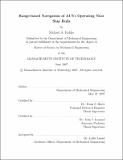| dc.contributor.advisor | Franz S. Hover and John J. Leonard. | en_US |
| dc.contributor.author | Kokko, Michael A. (Michael Andrew) | en_US |
| dc.contributor.other | Massachusetts Institute of Technology. Dept. of Mechanical Engineering. | en_US |
| dc.date.accessioned | 2008-02-27T20:35:37Z | |
| dc.date.available | 2008-02-27T20:35:37Z | |
| dc.date.copyright | 2007 | en_US |
| dc.date.issued | 2007 | en_US |
| dc.identifier.uri | http://hdl.handle.net/1721.1/40292 | |
| dc.description | Thesis (S.M.)--Massachusetts Institute of Technology, Dept. of Mechanical Engineering, 2007. | en_US |
| dc.description | This electronic version was submitted by the student author. The certified thesis is available in the Institute Archives and Special Collections. | en_US |
| dc.description | Includes bibliographical references (p. 107-109). | en_US |
| dc.description.abstract | In-water ship hull inspection is essential for both routine preventative maintenance as well as for timely detection and neutralization of limpet mines planted on military and commercial vessels. While a host of inspection methods have been proposed for this task, Autonomous Underwater Vehicles (AUVs) are particularly well-suited for such missions as they require neither constant human supervision nor a restrictive tether as do Remotely Operated Vehicles (ROVs). MIT and Bluefin Robotics have jointly developed a Hovering AUV (HAUV) for the inspection of ship hulls and other submerged marine structures which has been successfully demonstrated to achieve a coverage rate on the order of 700m2/hour with centimeter-scale resolution for a variety of hull types. AUV navigation often involves dead reckoning based on velocity measurements from an acoustic Doppler Velocity Log (DVL) sensor. As this strategy is inherently susceptible to drift, related efforts seek to generate vehicle position updates through either Simultaneous Localization and Mapping (SLAM) or the use of external sensor networks. In this work we propose a unique localization approach which relies on range measurements taken to surfaces of known curvature. | en_US |
| dc.description.abstract | (cont.) The algorithm is developed for navigating relative to simple parabolic curvatures and is tested both in simulation and on a floating raft robot. Localization and servoing are demonstrated in real-time to achieve estimated position deviations within millimeters of their expected values. In addition to exploring other facets of hull-relative navigation, this thesis also documents a significant mechanical redesign of certain HAUV components. | en_US |
| dc.description.statementofresponsibility | by Michael A. Kokko. | en_US |
| dc.format.extent | 109 p. | en_US |
| dc.language.iso | eng | en_US |
| dc.publisher | Massachusetts Institute of Technology | en_US |
| dc.rights | M.I.T. theses are protected by copyright. They may be viewed from this source for any purpose, but reproduction or distribution in any format is prohibited without written permission. See provided URL for inquiries about permission. | en_US |
| dc.rights.uri | http://dspace.mit.edu/handle/1721.1/7582 | |
| dc.subject | Mechanical Engineering. | en_US |
| dc.title | Range-based navigation of AUVs operating near ship hulls | en_US |
| dc.title.alternative | Range-based navigation of Autonomous Underwater Vehicles operating near ship hulls | en_US |
| dc.type | Thesis | en_US |
| dc.description.degree | S.M. | en_US |
| dc.contributor.department | Massachusetts Institute of Technology. Department of Mechanical Engineering | |
| dc.identifier.oclc | 190863901 | en_US |
